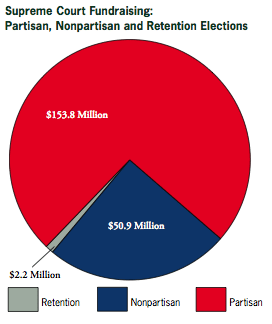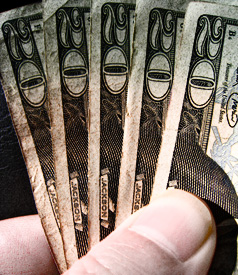Last year, the Supreme Court ruled that a West Virginia State Supreme Court judge should have recused himself from a case involving Massey Energy because of an “extreme” conflict of interest. Massey CEO Don Blankenship had spent $3 million to get the judge elected, even running ads accusing the lawyer’s opponent of voting to free an incarcerated child rapist and of allowing that rapist to work in a public school.
An exhaustive study released today, however, shows that big-money influence in judicial elections is hardly limited to that case. A trio of nonpartisan policy groups — the Justice at Stake Campaign, the Brennan Center for Justice at NYU School of Law, and the National Institute of Money in State Politics — found that spending on state Supreme Court races has more than doubled in the past 10 years. From 2000 through 2009, $207 million dollars were spent on judicial races, with much of the money coming from partisan special interest groups. Among the study’s findings:
- Special interest groups and party organizations accounted for 52 percent of all national TV spending in 2009 — “the first time that noncandidate groups outspent the candidates on the ballot.”
- The top five spenders in the top 10 costliest states invested an average of $473,000 in judicial elections, while the remaining 116,000 contributors averaged $850 each. According to the authors, the disparity suggests that “a small number of special interests dominated judicial election spending even before the Citizens United case ended bans on election spending by corporations and unions.”
- In 11 of 17 races in 2007-08, the candidate that raised the most money won his or her contest.

In the forward to the report, former Supreme Court Justice Sandra Day O’Connor wrote: “This crisis of confidence in the impartiality of the judiciary is real and growing. Left unaddressed, the perception that justice is for sale will undermine the rule of law that the courts are supposed to uphold.” But not all of the current Supreme Court justices agree: Roberts, Alito, Thomas and Scalia dissented from the Massey decision, saying that if judges recuse themselves because of the money spent to elect them, it would encourage “groundless” charges that other “judges are biased.”
The report does highlight some seeds of change, however: Wisconsin, North Carolina, New Mexico, and West Virginia have already enacted public financing for judicial elections, and polls show continued strong public support for reform measures like public financing, election voter guides, recusal reform and full financial disclosure for election ads.
Join us in defending the truth before it’s too late
The future of independent journalism is uncertain, and the consequences of losing it are too grave to ignore. To ensure Truthout remains safe, strong, and free, we need to raise $43,000 in the next 6 days. Every dollar raised goes directly toward the costs of producing news you can trust.
Please give what you can — because by supporting us with a tax-deductible donation, you’re not just preserving a source of news, you’re helping to safeguard what’s left of our democracy.
